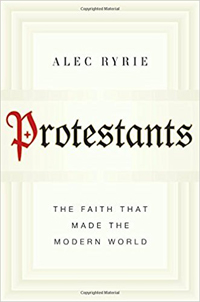 Alec Ryrie, Protestants: The Faith That Made the Modern World (New York: Viking, 2017), 513pp.
Alec Ryrie, Protestants: The Faith That Made the Modern World (New York: Viking, 2017), 513pp.
The year 2017 saw a flood of books to commemorate the 500th anniversary of the Protestant Reformation. Alec Ryrie, a professor at Durham University in England and a licensed minister in his local church, widens his lens to consider what it is that Martin Luther unleashed upon the entire world when he nailed his 95 Theses to the church door at Wittenberg. By any measure, it's shocking to contemplate. How was it that a young monk, at a new university, in an obscure little town, lit the fuse and touched such a nerve as to convulse all of Europe and, eventually, the whole world? Ryrie has a gift for sparkling prose and a bibliographic command of his sources that enable him to write with grace and confidence. He clearly admires the Protestant tradition, but he's hardly uncritical.
Protestantism, says Ryrie, has been one of the most creative and disruptive forces in human history. It's impossible to understand our modern world without understanding it — how we think about ourselves, society, and, of course, God. In his view, the particular legacy of Protestantism is threefold: free inquiry by the individual person, whose conscience is inviolable and sovereign; democracy as a way to organize society (all those free inquirers questioning every human authority and tradition); and apoliticism, the belief that only God is absolute and deserving of unconditional obedience, so that politics are relative and deserving only of conditional support. Stated differently, the spiritual kingdom of God ultimately matters more than the material kingdoms of the politicians.
Ryrie begins with Luther and, in a sweeping panorama, ends with the fortunes of Protestantism in South Africa, the two Koreas, China, and global Pentecostalism ("the most dramatic religious success story of modern times"). I especially appreciated the respect he gives to groups that are routinely ignored, like the Seventh-day Adventists and Jehovah's Witnesses, two of the very few Christian groups in World War II to openly defy the Nazi state. His treatments of slavery and anti-Semitism are unsparing but nuanced. For Ryrie, Protestantism isn't so much about theological identity, culture, institutions, or doctrines, but instead "that old love affair: a direct encounter with God's power, whether as a lived experience, a memory, or a hope" (467).


